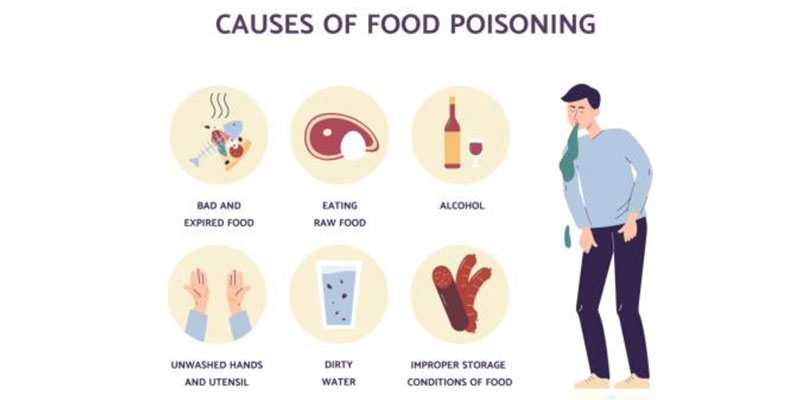5 Reasons Why Your Weight Changes Daily
Dec 08, 2023 By Madison Evans
Daily weight fluctuations are common and influenced by factors beyond fat gain or loss. Your body's hydration levels, food intake, hormonal changes, and even bowel movements can impact the number on the scale. Understanding these factors can help you interpret daily weight changes more accurately and avoid unnecessary concern about minor fluctuations. Here are the five reasons why your weight fluctuates daily.
Water Retention Causes Daily Weight Fluctuations

Water retention is one of the biggest reasons your weight changes daily. When your body holds onto excess fluid, the number on the scale goes up. Hormone changes, especially in women, can lead to water retention. Fluctuations in estrogen levels during your menstrual cycle are a common cause of temporary weight gain from fluid buildup.
Too much sodium in your diet causes your kidneys to retain water to dilute the sodium in your bloodstream. Cut back on salty foods like chips, pizza, and canned soups to see a drop in water weight. Lack of sleep or high stress can increase the hormone cortisol, which signals your body to store more water. Doing relaxing activities like yoga, meditation, or deep breathing helps lower pressure and promotes better sleep.
The good news is water weight usually fluctuates by no more than 5 pounds and is temporary. By pinpointing the underlying cause of your fluid retention and making appropriate lifestyle changes, you can get back to your average.
Your Bowel Movements Impact Weight Changes
Going to the bathroom is essential for eliminating waste from your body, but it also means temporarily losing water weight and whatever else you've expelled. For most people, bowel movements average 1-2 pounds of waste, so if you haven't gone to the bathroom recently, that could impact your weight for the day.
Staying regular is critical. Aim for a bowel movement 1-2 times per day to keep things moving and minimize weight changes daily. If you're constipated, drink more water, eat high-fiber foods like beans, broccoli, and bran cereals, and exercise daily.
What goes in must come out. The more you eat and drink, the more you'll need to use the bathroom. Notice how certain foods affect your digestion and bowel habits so you know what to expect. Hydrate, hydrate and hydrate. Aim for 6-8 glasses daily to stay hydrated and keep things flowing. Dehydration is a common cause of constipation and weight fluctuations.
Eating More Sodium Makes You Retain Water Weight
Eating a lot of sodium, like in salty foods, canned soups, or processed meats, causes your body to retain water. This results in temporary water weight gain that has nothing to do with fat. Sodium attracts water to help dilute it in your body. The more sodium you consume, the more water your body retains to balance it out.
For every 1 gram of sodium your body holds onto, it retains 3 grams of water. So, eating an extra 500 milligrams of sodium could give you an additional 1.5 pounds of water weight. This water weight usually disappears over the next day or two once your body balances its sodium levels.
Limit processed and pre-made foods, which tend to be high in sodium. Cook more at home using fresh ingredients to control how much salt goes into your food. Simple changes to reduce sodium intake can minimize annoying daily fluctuations on the scale from water weight gain and loss. Focus on your overall health and wellness rather than obsessing over the numbers.
Exercise and Muscle Inflammation Lead to Temporary Weight Gains

When you exercise, your muscles experience minor tears and damage. This causes inflammation in the muscles as your body rushes to repair them. The inflammation process requires extra fluid, so your body retains more water. This additional water weight usually disappears within a few days as your muscles heal. Staying hydrated and elevating your legs can reduce fluid buildup.
The muscle tissues swell as your muscles rebuild more muscular fibers. This swelling adds extra pounds that will disappear once your muscles recover. The amount of swelling depends on the intensity and duration of your workout.
Your body stores carbohydrates in your muscles and liver as glycogen. When you exercise vigorously, your body uses up its glycogen stores for energy. Your muscles replenish their glycogen after a challenging workout, so they gain weight from the extra carbohydrates and water attached. Your body retains 3 to 4 grams of water for every gram of glycogen.
Focus on staying active and fueling your body appropriately. Your weight will stabilize once the healing and recovery process is complete.
Hormones Cause Water Retention and Bloating
Your hormones constantly fluctuate, which can lead to changes in water retention and temporary weight gain.
Estrogen levels rise and fall during a menstrual cycle. As estrogen increases, it can cause fluid retention and bloating. You may notice your weight increase by a few pounds around ovulation and before your period. The good news is this weight gain is temporary and will go away once your hormone levels stabilize and your period ends.
Cortisol is known as the "stress hormone." because its levels rise when you're under pressure or tension. Elevated cortisol leads to water retention and weight gain around the midsection. If you've had some stressful days at work or home recently, excess cortisol could be causing your weight to go up for the time being. Try relaxation techniques like yoga or meditation to help lower cortisol and get your weight back normal.
The thyroid gland produces hormones that regulate your metabolism. If your thyroid levels are low, your metabolism slows, and weight gain can occur. An underactive thyroid, known as hypothyroidism, frequently causes fluid retention and weight changes.
Insulin is the hormone that regulates blood sugar levels .When you eat many high-sugar or high-carb foods, your body produces more insulin, leading to fluid retention and weight gain. Cutting back on sugary and starchy foods may help get your insulin and weight fluctuations under control.
Conclusion
Focus on the overall trend in your weight over weeks and months rather than getting caught up in daily fluctuations. Pay attention to how your clothes are fitting and how you feel rather than what the scale says every morning. Your weight is just one measure of your health and fitness, so make sure also to consider things like your energy levels, strength, and endurance. Stay consistent with good habits, and you'll continue progressing toward your goals.







